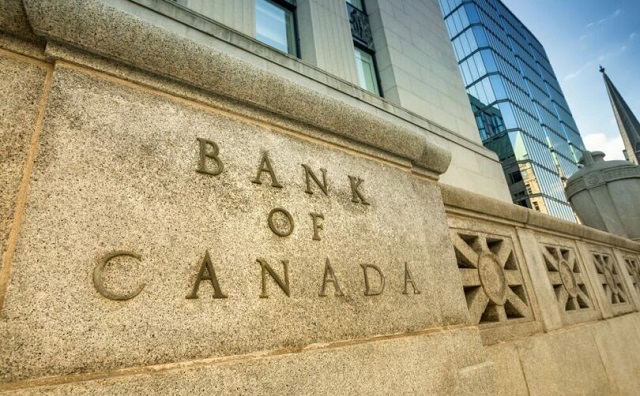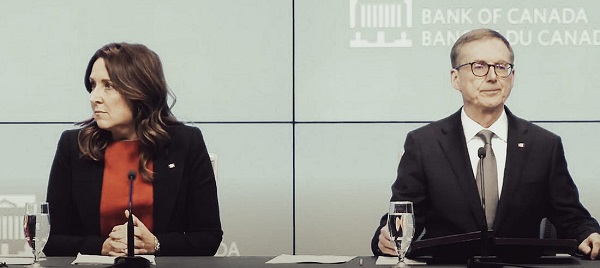Banks
Canadian bankers ask gov’t to let them view private citizens’ tax returns

From LifeSiteNews
In addition to the Canadian Bankers Association, Mortgage Professionals Canada has also requested that it be allowed to view confidential tax records, saying a ‘digital income verification tool is an urgently required fraud prevention solution.’
The Canadian Bankers Association has asked Canada’s Senate banking committee to allow large banks to view people’s confidential federal personal tax returns via electronic access for what it claims is to verify one’s income to combat fraud.
According to Blacklock’s Reporter, the Association’s chief economist Alex Ciappara claims the measure would cut costs while allowing “banks to reduce mortgage fraud that serves to drive up costs for borrowers.”
While mortgage fraud does occur, according to a 2004 report from the Canada Mortgage and Housing Corporation, it is quite rare.
“Fraud in land conveyancing does not appear to have reached crisis proportions in Canada,” said the report.
Ciappara, failing to elaborate on just how this new privilege would reduce fraud, insisted that allowing banks to see one’s gross income would be a “technology-based solution to reduce mortgage fraud.”
While the banks claim that being allowed to view one’s personal tax returns would help prevent mortgage “fraud,” it is not clear what the federal government of Prime Minister Justin Trudeau will do in this matter.
In addition to the Bankers Association, Mortgage Professionals Canada has also requested that it be allowed to view one’s confidential tax records, saying a “digital income verification tool is an urgently required fraud prevention solution.”
Governments allowing banks to access personal tax records is concerning given how the current federal government has a history of intruding on one’s personal finances. An example of this was in 2022, when Finance Minister Chrystia Freeland took the unprecedented step of demanding that banks freeze the accounts of anyone involved in the Freedom Convoy protest in Ottawa, without a court order.
Of note is that similar infrastructure blocking protests have taken place in recent weeks in Canada, over the Israel-Hamas conflict, yet no extraordinary measures have been taken to stop protesters by the Trudeau government.
Should banks be allowed to access one’s personal tax returns, it might not stop at just being allowed to verify one’s income but could extend to making every single transaction searchable.
Freeland is a member of the Board of Trustees for the World Economic Forum (WEF), which is the group behind the now-infamous “Great Reset,” an agenda that critics say seeks to install a global system similar to that of China’s Social Credit System.
One of the WEF goals is to push governments to introduce a digital currency and ID system.
For the time being, it looks like Canada will not get a digital dollar.
The Bank of Canada (BOC) in August said that the creation of a central bank digital currency (CBDC) is not needed as many people rely on “cash” to pay for things, and that the introduction of a digital currency would only be feasible if consumers demanded its release.
However, the BOC did not fully rule out a digital dollar in the future.
As noted in a report from LifeSiteNews, experts warn that central bank digital currencies are a “control tool” of governments.
Conservative leader Pierre Poilievre promised that if he is elected prime minister, he would stop any implementation of a “digital currency” or a compulsory “digital ID” system.
Banks
Bank of Canada Slashes Interest Rates as Trade War Wreaks Havoc

With businesses cutting jobs, inflation rising, and consumer confidence collapsing, the BoC scrambles to contain the damage
The Bank of Canada just cut interest rates again, this time by 25 basis points, bringing the rate down to 2.75%. On the surface, that might sound like good news—lower rates usually mean cheaper borrowing, easier access to credit, and in theory, more money flowing into the economy. But let’s be clear about what’s actually happening here. The Canadian economy isn’t growing because of strong fundamentals or responsible fiscal policy. The Bank of Canada is slashing rates because the Trudeau—sorry, Carney—government has utterly mismanaged this country’s economic future. And now, with the U.S. slapping tariffs on Canadian goods and our government responding with knee-jerk retaliatory tariffs, the central bank is in full-blown damage control.
Governor Tiff Macklem didn’t mince words at his press conference. “The Canadian economy ended 2024 in good shape,” he insisted, before immediately admitting that “pervasive uncertainty created by continuously changing U.S. tariff threats have shaken business and consumer confidence.” In other words, the economy was doing fine—until reality set in. And that reality is simple: a trade war with our largest trading partner is economic suicide, yet the Canadian government has charged headlong into one.
Macklem tried to explain the Bank’s thinking. He pointed out that while inflation has remained close to the BoC’s 2% target, it’s expected to rise to 2.5% in March thanks to the expiry of a temporary GST holiday. That’s right—Canadians are about to get slammed with higher prices on top of already sky-high costs for groceries, gas, and basic necessities. But that’s not even the worst part. Macklem admitted that while inflation will go up, consumer spending and business investment are both set to drop as a result of this economic uncertainty. Businesses are pulling back on hiring. They’re delaying investment. They’re scared. And rightly so.
A BoC survey released alongside the rate decision shows that 40% of businesses plan to cut back on hiring, particularly in manufacturing, mining, and oil and gas—precisely the industries that were already hammered by Ottawa’s obsession with green energy and ESG policies. As Macklem put it, “Canadians are more worried about their job security and financial health as a result of trade tensions, and they intend to spend more cautiously.” In other words, this is self-inflicted. The government could have pursued a different approach. It could have worked with the U.S. to de-escalate trade tensions. Instead, Mark Carney—an unelected, Davos-approved globalist—is running the show, doubling down on tariffs that will raise prices for Canadians while doing absolutely nothing to change U.S. policy.
The worst part is that the Bank of Canada is completely cornered. It can’t provide forward guidance on future rate decisions because, as Macklem admitted, it has no idea what’s going to happen next. “We are focused on assessing the upward pressure on inflation from tariffs and a weaker dollar, and the downward pressure from weaker domestic demand,” he said. That’s central banker-speak for: We’re guessing, and we hope we don’t screw this up. And if inflation does spiral out of control, the BoC could be forced to raise rates instead of cutting them.
At the heart of this mess is a government that has spent years inflating the size of the state while crushing private sector growth. Macklem admitted that consumer and business confidence has been “sharply affected” by recent developments. That’s putting it mildly. The Canadian dollar has dropped nearly 5% since January, making everything imported from the U.S. more expensive. Meanwhile, Ottawa has responded to U.S. tariffs with a tit-for-tat strategy, placing nearly $30 billion in retaliatory tariffs on American goods. The BoC is now forced to clean up the wreckage, but it’s like trying to put out a fire with a garden hose.
And what about unemployment? Macklem dodged giving a direct forecast, but he didn’t exactly sound optimistic. “We expect the first quarter to be weaker,” he said. “If household demand, if business investment remains restrained in the second quarter, and you’ll likely see weakness in exports, you could see an even weaker second quarter.” That’s code for job losses. It’s already happening. The hiring freezes, the canceled investments—those translate into real layoffs, real pay cuts, real suffering for Canadian families.
Meanwhile, inflation expectations are rising. And once those expectations set in, they become nearly impossible to undo. Macklem was careful in his wording, but the meaning was clear: “Some prices are going to go up. We can’t change that. What we particularly don’t want to see is that first round of price increases have knock-on effects, causing other prices to go up… becoming generalized and ongoing inflation.” Translation: We know this is going to hurt Canadians, we just hope it doesn’t spiral out of control.
If this sounds familiar, that’s because it is. The same policymakers who told you that inflation was “transitory” in 2021 and then jacked up rates at record speed are now telling you that trade war-driven inflation will be “temporary.” But remember this: the BoC is only reacting to the mess created by politicians. The real blame lies with the people in charge. And now, that’s Mark Carney.
Macklem refused to comment on Carney’s role as prime minister, insisting that the BoC remains “independent” from politics. That’s cute. But the damage is already done. Ottawa picked a fight with the U.S. and now the BoC is left trying to prevent a full-scale economic downturn. The problem is, monetary policy can’t fix bad leadership. Canadians are the ones who will pay the price.
Banks
“Trade-Based Money Laundering IS THE FENTANYL CRISIS”: Sources expose Chinese-Mexican-Canadian Crime Convergence

Prime Minister Justin Trudeau attends a dinner at the home of a United Front Work Department leader in Vancouver.
‘That famous picture of Trudeau at a Vancouver dinner with all those Chinese guys—They’re all in there’: Source on United Front money laundering suspects surveilled by US Agency
VANCOUVER and TORONTO — As debate rages over President Donald Trump’s disruptive tariffs on Canada, Mexico, and China—whether they represent a genuine war on fentanyl deaths tied to each nation’s role in the deadly supply chain, or merely a pretext for U.S. trade dominance—multiple Canadian and U.S. government sources have stepped forward to highlight a factor they believe North American citizens aren’t grasping amid Trump’s political rhetoric.
They point to the staggering scale and sophistication of trade-based money laundering orchestrated by Chinese Triads in Canada and Mexican cartels. This is a predominant concern in Canada, alongside revelations of so-called fentanyl superlabs hidden in rural areas, yet easily supplied by Canadian transportation hubs—shipping, rail, and trucking networks saturated with organized crime. These sources insist this little-understood form of criminal money laundering not only fuels fentanyl trafficking—ultimately linked to a complicit Beijing—but directly finances drug shipments initiated by Chinese networks in Toronto and Vancouver, sending fentanyl, methamphetamine, and cocaine across the Mexican border into California, specifically to trucking hubs around Los Angeles.
According to the primary source—a Canadian expert familiar with what they classify as an intricate trilateral partnership between Chinese Triads, the Chinese Communist Party’s United Front foreign influence networks, and Latin American cartels—these economic networks have effectively infiltrated multiple industries and commodities markets on Canada’s and Mexico’s west coasts, using them to conceal and amplify proceeds from fentanyl transactions.
In 2023, Canada’s financial watchdog, Fintrac, reported that Chinese networks had evolved beyond traditional casino-based laundering methods in Vancouver and Toronto, now mastering laundering through Canadian banks, law offices, real estate, and diaspora-based fraud networks. Yet according to The Bureau’s criminal intelligence source, these same networks—operating alongside the Sinaloa Cartel—also traffic in a range of commodities, from poached wildlife and agricultural staples like avocados and limes to rare Chinese delicacies such as geoduck, a phallic-shaped clam prized in hot pot and believed to have aphrodisiac properties.
The same source contends that while Canadian government agencies—including the RCMP, Fintrac, CBSA, and CSIS—understand the key players in the fentanyl trade, systemic issues within Canadian policing and prosecution allow these networks to operate with near impunity:
“The RCMP knows they have no framework within the Criminal Code, no resources, and no support from prosecution services. They just have no ability. And this whole thing with Trudeau saying that only 43 kilos of fentanyl—less than one percent—is coming from Canada is such a joke. It’s the interweaving of trade-based money laundering—if the public knew, it would blow their minds. I believe the U.S. government and Trump know it, and that’s why he’s doing what he’s doing.”
Put another way, what this expert and others argue is that the drug and trade wars engulfing the United States and China are not polarities—they are a single, intertwined conflict, with trade-based money laundering as the critical convergence. And the growing concern—that Canadian and Mexican governments might be benefiting from this illicit trade, perhaps even to the point of complicity—cannot be entirely dismissed.
The exposure of Canada’s prime minister to money laundering networks presents a layer of intrigue and troubling optics, likely recognized in Washington, according to four sources across Canada.
The primary source for this story—reinforcing explosive claims by other Canadian police experts in a recent investigation by The Bureau—provided specific new details, identifying major money laundering networks in Vancouver of concern to U.S. authorities. Among them were high-profile suspects openly acknowledged at a fundraising event attended by Prime Minister Justin Trudeau.
Specifically, the source identified Chinese individuals who had entered Canada on a private jet flagged by a U.S. government agency, which asked the RCMP to surveil them in Vancouver. These suspects were linked to a commercial real estate investor in Vancouver with direct ties to Beijing, and to organized crime figures connected to Beijing’s United Front in Canada.

The gates of an RCMP targeted property in Richmond, British Columbia.
The same individuals, notorious in elite Canadian enforcement circles, appeared in suspicious transaction reports and were central to a sweeping police intelligence investigation into vulnerabilities in Canada’s banking system. This investigation, known as Project Athena, was a major anti-gang initiative examining reports from Canada’s financial intelligence agency, Fintrac. Project Athena emerged after the collapse of its predecessor case, E-Pirate—reportedly Canada’s largest-ever drug money laundering probe—which targeted Chinese underground bankers in Vancouver and Toronto linked to the Sam Gor network, a Chinese syndicate dominated by the 14K, Big Circle, and Sun Yee On Triads.
As part of Project Athena, investigators uncovered a single money service bureau in Hong Kong that moved CAD $973 million over three years, primarily through Canadian banks. Several United Front and Triad-linked suspects from earlier investigations were tied to these transactions.
“That famous picture of Trudeau at a Vancouver dinner with all those Chinese guys—the ones we all know from various media reports? They’re all in there. They’re all in there moving money around,” the source said. “And this was just one money service bureau. Nearly a billion dollars in three years. So how many others are there?”
 |
Paul King Jin and a number of Toronto and Vancouver-based Sam Gor associates targeted in the E-Pirate probe survived a 2020 gang execution in a Richmond sushi diner; Jin’s alleged underground banking partner Jian Jun Zhu was shot to death.
Buttressing their case, the source pointed to a remarkable cache of technical evidence seized from an underground casino in Richmond, just south of Vancouver, detailing the complexity of trade-based money laundering.
The evidence came from a mid-level Chinese Triad operative working for one of the underground banking bosses exposed in the RCMP’s E-Pirate probe of Sam Gor’s casino money-laundry networks.
In this subsequent investigation into Richmond-based underground casinos, investigators uncovered over 1,000 messages—texts, videos, and calls—confirming what Canadian authorities had long suspected and what American intelligence had warned about: the convergence of Triads and Mexican cartels.
In a microcosm, a mid-level Sam Gor agent in Vancouver and their Mexican cartel counterpart, coordinating major transborder narcotics and money laundering schemes, exemplified how Chinese and Mexican transnational networks dominate North American fentanyl trafficking.
Beyond coded drug negotiations, the messages revealed a broad trafficking scheme involving food and various commodities. As the law enforcement source explained, Triads and cartels exploit these commodities to launder illicit profits, amass market share, and tighten their grip on global supply chains.
The conversations demonstrated how narcotics could be smuggled across the border into California as easily as fresh produce or seafood was funneled into international markets.
“It was stunning, absolutely stunning to see coded drug talk, of course, all of that, the usual stuff that we expected to see—how they were going to get it shipped over the border in Mexico, that they had the ability to deliver into the Los Angeles area just north of Los Angeles,” the Canadian expert recalled. “And they would pick it up at these huge truck stops and they would specify in detail which vehicle. But what was equally stunning, was the fact that these two guys were also involved in a wide array of other items, consumer goods, everything from avocados to limes to geoduck clams to lobster, to anything that made a buck and allowed them to launder funds and to move capital through the system. They were trade-based money laundering experts.”
It was similar to the phenomenon seen domestically with Hells Angels in Vancouver infiltrating trucking and construction—but now expanded internationally via cartels and Triads, triangulating trade between China, Mexico, and Canada, the source argued.
The Triads and cartels use false invoicing and front companies, trade-money laundering experts say, securing meth and fentanyl shipments into the United States in exchange for sending legal commodities to Mexico or China. Drug shipments are often concealed within legitimate and counterfeit goods manufactured in China.
“And so they start taking over industries. That’s why your price of limes is what it is today—because the cartels have cornered the market, trying to put those drug proceeds somewhere. So let’s start buying up commodities and controlling sectors. And that’s what this case was. It confirmed everything we had received and heard from the FBI and DEA in bulletins for many years.”
The source added that while this particular cache of communications involved methamphetamine and cocaine—referred to as “glass” and “girls” in coded narco communications—it did not directly pertain to fentanyl. However, the Triad operator and the Mexican cartel associate appeared to broach the subject, at which point the cartel operative redirected the Canada-based Triad to another handler in Mexico.
“The cartel guy he was speaking with on this particular phone was the one handling coke and meth,” the source said. “So it’s like, ‘Hey, I’m interested in this.’ ‘Oh, I don’t deal with that. That’s my associate. You’ll have to go through someone else.’ They segment it. It’s just such a tapestry—but we’re still asleep at the wheel here.”
 |
Prime Minister Justin Trudeau attends a dinner at the home of a United Front Work Department leader in Vancouver.
Disclosing the stunning connections and scale of Triad influence on Canada’s West Coast, the source said the “underling” whose device was seized—revealing hundreds of money laundering and drug transaction deals between the Triad and a Mexican cartel—was working for one of the targets in the E-Pirate investigation, a Vancouver underground banking boss.
That same boss was tracked by the RCMP in another shocking and illustrative incident involving two Chinese airline pilots passing through Vancouver who were caught smuggling bear-paw parts. Like any other travelers, the Chinese pilots underwent standard security checks and were found carrying contraband poached in Canada. Parts from bears—and even massive polar bear mounts harvested from northern Canada—are sold for significant profits to Chinese buyers, the expert explained.
In this case, when the Chinese pilots were released from jail, the individual who arrived to collect them was an underling of the E-Pirate underground banking boss—a major figure in Chinese organized crime in North America. This individual is also said to be responsible for the large-scale export of luxury vehicles from Vancouver to China, the Canadian expert said.
“We found out that a hundred-thousand-dollar Mercedes here in Vancouver is worth between three and five times that overseas. So there’s your money laundering right there.”
The process operates much like the drug-cash laundering schemes identified by U.S. experts, including former Trump administration senior investigator David Asher. Asher contends that the Department of Justice’s $3 billion USD TD Bank money laundering prosecution exposed how Chinese international students—under the direction of China’s United Front Work Department cells—were tasked with collecting and depositing drug cash into bank accounts, transforming illicit funds into real estate mortgages for powerful Chinese criminals operating behind the scenes.
A similar system using Chinese students operates in Vancouver’s luxury vehicle market and drug cash collection networks, a Canadian expert said, describing it as a “diversification” of narco-laundering.
“So imagine moving a hundred thousand dollars’ worth of capital here and walking away with a $400,000 net profit overseas,” the expert explained. “It’s perfect. Then you buy the chemicals, ship them to Mexico, make the meth, make the fentanyl, and move the product north through the States or by other routes. But that’s the part people are just not connecting and are not willing to contemplate.
“We’ve got to embrace the complexity of it all. Every conceivable way you can think of to move product—that’s what they’re doing. Land, sea, air. Because just like a good corporation or investor diversifies their financial portfolio to limit risk, the same logic applies to fentanyl trafficking.”
Meanwhile, Eastern Canadian counterparts agreed. One source—who could not be identified but has expertise in Canadian mortgage regulations and private due diligence on mortgage lending fraud—provided industry-based insight into the players involved in the RCMP’s Project Athena investigation and related Fintrac reports. These reports examined 48,000 pandemic-era banking transactions within the Chinese diaspora, involving Canadian banks and ‘money mule’ accounts—often fronted by Chinese students—used to fund fraudulent mortgages with funds wired from Hong Kong and China.
The industry source estimated that systemic fraud plagues the Greater Toronto real estate market. According to this source, up to 20 percent of home purchases involve fraudulent mortgage applications.
“I am the street-level witness of how banks finance criminal activity. Extrapolating my findings, the amount of money embedded in Canadian housing is enough to make one weep,” they said, estimating that more than CAD $1 trillion may have been laundered through Toronto real estate in this manner over the past 12 years.
 |
This Greater Toronto mansion was associated with the same Sam Gor Triad networks and United Front operatives active in Vancouver, police and intelligence sources say.
The source affirmed that their knowledge aligns with Fintrac’s findings on underground banking and diaspora lending, noting that beyond the Chinese migrant community, industry experts have identified similar investment and lending schemes within the Indian diaspora. Meanwhile, several Eastern Canadian police sources familiar with Fintrac’s findings on Chinese diaspora money flows—as well as large-scale vehicle theft and trade-based money laundering investigations—said they also believe Greater Toronto is a key money laundering and drug transport hub for the Triad-Cartel nexus, a concern Washington has expressed deep alarm over.
“One thing that isn’t being talked about on this side of the border in this recent activity is the pervasiveness of money laundering and its links to all of the criminality,” one police source said.
Another expert suggested that Greater Toronto could be the largest drug-trafficking market by volume in North America, adding that diaspora-based crime groups exert significant influence over all modes of transportation across Ontario, including air traffic. “So you have a few hundred more officers driving up and down the border routes now?” they said, chuckling derisively.
A U.S. government expert criticized Canada’s government and media—particularly reporting from The Globe and Mail that echoes Prime Minister Trudeau’s seizure data arguments—for failing to grasp the scale of fentanyl and illicit trade, calling the country’s focus on relatively small seizure data misleading.
This expert aligned with Canadian federal law enforcement officials who point to highly sophisticated, trade-based money laundering schemes linking Mexican cartels and Chinese Triad networks operating in Vancouver and Toronto. These networks, the U.S. expert explained, facilitate the cross-border flow of methamphetamine, cocaine, and fentanyl, using multi-commodity trade-based money laundering transactions to disguise their profits.
They suggested that Canada either lacks a full understanding of the issue or is failing to take U.S. concerns seriously. By not adopting a more forthright stance—particularly in assessing the scale of money laundering linked to illicit drugs and organized crime—they believe Canada is ultimately undermining its own interests. Meanwhile, U.S. authorities, they asserted, have a clearer and more comprehensive picture of the problem.
This could explain why, following his unexpected victory in the November 2024 election, President Donald Trump swiftly threatened tariffs on Canada and Mexico—a move that puzzled and stunned most observers.
Two Canadian sources suggested the decision was influenced, at least in part, by a bipartisan congressional report on fentanyl released in December.
“It’s certainly one of the most pressing and high-profile developments in the crisis,” one source said.
The congressional working group behind the report spent months expanding on the Select Committee’s bipartisan investigation, which, for the first time, documented how the Chinese Communist Party directly subsidizes the production of fentanyl precursors and analogues.
Lawmakers are now advancing three bipartisan bills aimed at bolstering law enforcement, expanding sanctions against Chinese-backed entities involved in drug trafficking, and imposing financial penalties on organizations that fail to enforce transparency measures to curb illicit drug flows.
“For too long, China has profited from the destruction of American lives, and the fentanyl crisis they are fueling knows no borders,” said Representative Dan Newhouse, chairman of the congressional working group. “As we continue fighting the immediate threat this drug poses, we are also going after the CCP and its central role in subsidizing, producing, and exporting the precursors that drive this epidemic.”
In response to Trump’s formal imposition of tariffs on Tuesday, Canada’s Finance Ministry issued a statement emphasizing the country’s efforts to combat fentanyl smuggling. “Less than 1 percent of fentanyl and illegal crossings into the United States come from Canada, yet the government launched a $1.3 billion border plan with new choppers, boots on the ground, more coordination, and increased resources to stop the flow of fentanyl,” the statement read.
That same day, U.S. Senator Jeanne Shaheen, ranking member of the Senate Foreign Relations Committee, issued a sharp rebuke of Trump’s economic policies following his joint address to Congress.
“President Trump’s address this evening laid bare a cynical and profoundly dangerous approach to America’s global leadership,” Shaheen said. “His 25 percent tariffs on Mexico and Canada—our closest trading partners—threaten to unravel decades of economic cooperation and will inevitably result in economic consequences for American workers and businesses.”
But a Canadian expert dismissed Canada’s efforts as insufficient.
“If you really want to do something lasting here—I mean, I don’t want to sound like I’m pro-Trump in that sense—but you’d have to have a leader in this country willing to crack open the Charter and the criminal code and make radical changes,” the expert said. “This is stuff Canada should have addressed 25 years ago. But through successive liberal governments, we’ve allowed it to continue, and now we’re caught with our pants down.
“If we think we can just start throwing numbers at this and that’ll fix it, that’s a mistake,” the expert continued. “The problem is the framework in Canada—it has made this attractive. The police know what’s going on, but they don’t have the tools to prosecute and disincentivize this. Trump knows this. Imagine it from his perspective: He’s surrounded by weaklings exploiting and killing Americans. He’s not wrong.”
Underscoring the paralysis of Canada’s federal police under the current legal framework, the source reiterated that a broken prosecutorial system not only fails to secure charges against entrenched Chinese and Mexican criminal networks but refuses to even consider cases.
“This is what happens when you’ve got such a decayed system—whether it’s the Charter of Rights, the Criminal Code, the prosecution services, or just the broader demoralization of policing, compounded by chronic resourcing issues for years,” the primary source for this story said. “They just go for the easy stuff. Anything complex—they don’t touch it. I don’t think they’ve tackled a serious file since the E-Pirate case collapsed. The prosecution service basically said, ‘Look, we’re dealing with the same resourcing issues. Don’t send us these complex files. We can’t handle anything with more than three names listed in your report.’”
The Bureau is a reader-supported publication. To receive new posts and support my work, consider becoming a free or paid subscriber.
Please support a public interest startup. We break international stories and this requires elite expertise, time and legal costs.
-

 Media17 hours ago
Media17 hours agoTop Five Huge Stories the Media Buried This Week
-

 2025 Federal Election16 hours ago
2025 Federal Election16 hours ago2025 Federal Election Interference from China! Carney Pressed to Remove Liberal MP Over CCP Bounty Remark
-

 Addictions2 days ago
Addictions2 days agoThere’s No Such Thing as a “Safer Supply” of Drugs
-

 Uncategorized15 hours ago
Uncategorized15 hours agoPoilievre on 2025 Election Interference – Carney sill hasn’t fired Liberal MP in Chinese election interference scandal
-

 Censorship Industrial Complex12 hours ago
Censorship Industrial Complex12 hours agoWelcome to Britain, Where Critical WhatsApp Messages Are a Police Matter
-

 Economy2 days ago
Economy2 days agoClearing the Path: Why Canada Needs Energy Corridors to Compete
-

 Automotive2 days ago
Automotive2 days agoTrump warns U.S. automakers: Do not raise prices in response to tariffs
-

 2025 Federal Election16 hours ago
2025 Federal Election16 hours ago2025 Election Interference – CCP Bounty on Conservative Candidate – Carney Says Nothing












